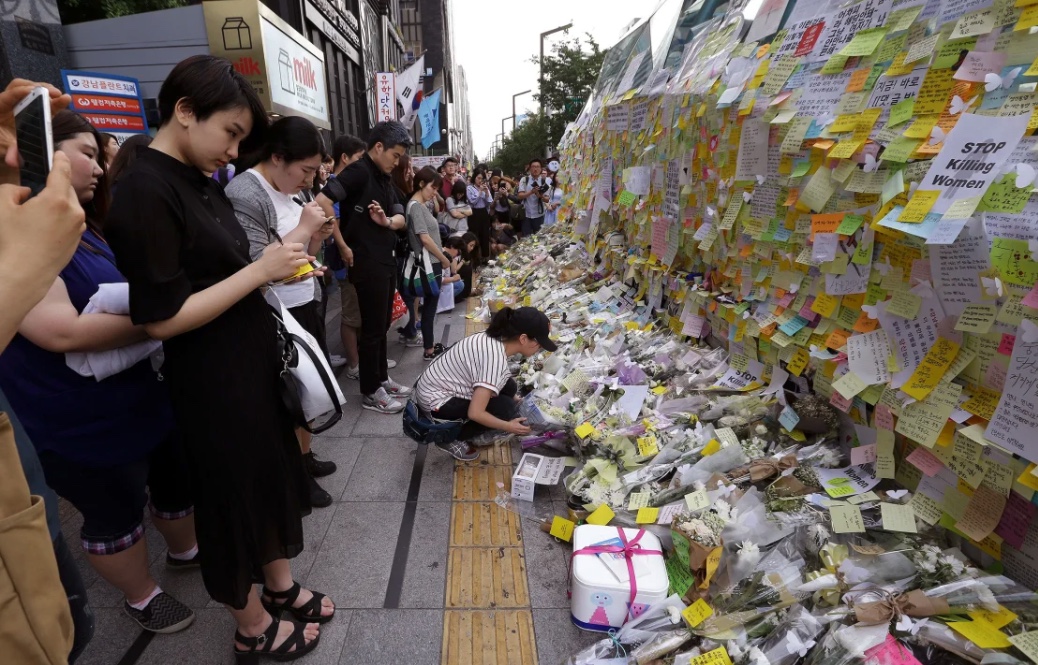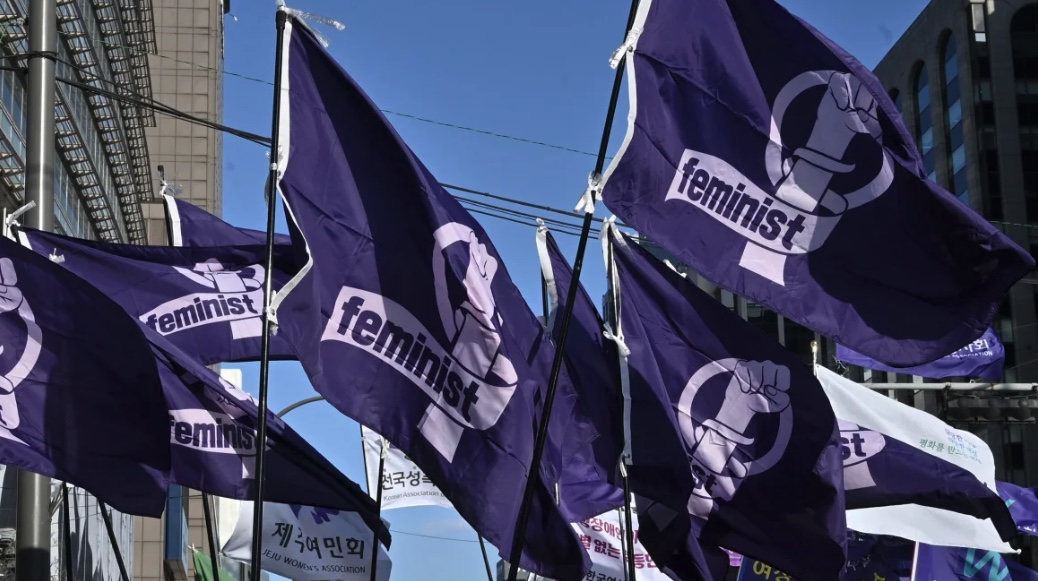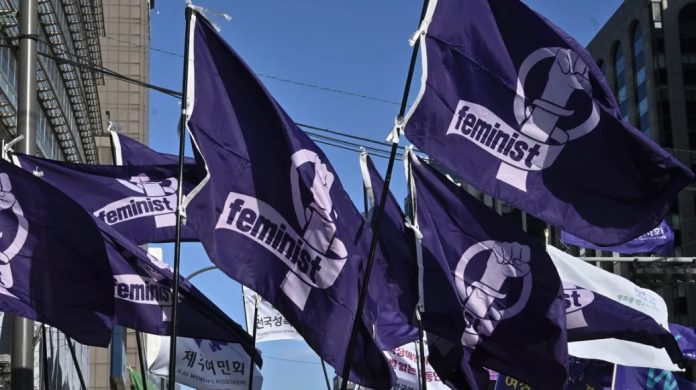ในช่วงหลายชั่วโมงหลังจากที่ผลการเลือกตั้งแสดงชัดเจนว่า โดนัลด์ ทรัมป์ จะได้เป็นประธานาธิบดีสหรัฐอเมริกาสมัยที่สอง ขบวนการ 4B ซึ่งเป็นขบวนการที่เกิดขึ้นในเกาหลีใต้ก็ได้รับความสนใจมากขึ้นในสหรัฐฯ โดยผู้หญิงจะปฏิเสธการแต่งงาน การมีลูก การออกเดท หรือการมีเพศสัมพันธ์กับผู้ชาย ขบวนการนี้ได้รับความนิยมจากผู้หญิงรุ่นใหม่บนแพลตฟอร์ม TikTok และ Instagram ที่กำลังพูดถึงและแบ่งปันข้อมูลเกี่ยวกับขบวนการนี้ เนื่องจากความไม่พอใจหลังจากที่ผู้ชายส่วนใหญ่ลงคะแนนเสียงเลือกทรัมป์ ซึ่งถูกตัดสินว่ามีความผิดในคดีการล่วงละเมิดทางเพศ และการแต่งตั้งผู้พิพากษาศาลฎีกาสามคนที่ทำให้สิทธิการทำแท้งในสหรัฐฯ ถูกยกเลิก
ผู้หญิงเหล่านี้กล่าวว่า พวกเธอรู้สึกโกรธและท้อแท้จากการที่พวกเธอได้พยายามเรียกร้องความปลอดภัยจากผู้ชายมาโดยตลอด แต่ยังคงถูกเกลียดชังอยู่ พวกเธอจึงตัดสินใจจะปฏิเสธผู้ชายและกระตุ้นให้ผู้หญิงคนอื่น ๆ ทั่วประเทศทำเช่นเดียวกัน
“เราพยายามทุกอย่างแล้ว เราขอร้องและขอความช่วยเหลือจากผู้ชายเพื่อความปลอดภัยของเรา และทำทุกอย่างที่สังคมบอกให้ทำ แต่พวกเขาก็ยังเกลียดเราอยู่ดี” แอชลี่ พอลลาร์ด หญิงวัย 36 ปีจากเซนต์หลุยส์กล่าวกับ CNN “ดังนั้น ถ้าพวกเขาจะเกลียดเรา เราก็จะทำในสิ่งที่เราอยากทำ”
ขบวนการ 4B คืออะไร?
4B คือคำย่อของคำภาษาเกาหลี 4 คำ ได้แก่ บีฮน (ไม่แต่งงาน), บีชุลซัน (ไม่มีลูก), บียอแน (ไม่ออกเดท) และ บีเซ็กซึ (ไม่มีกิจกรรมทางเพศกับผู้ชาย) ขบวนการ 4B เกิดขึ้นในเกาหลีใต้ประมาณปี 2015 หรือ 2016 โดยได้รับความนิยมในหมู่ผู้หญิงอายุน้อยในช่วง 20 ต้น ๆ และเป็นการเคลื่อนไหวที่เกิดขึ้นเป็นส่วนหนึ่งของขบวนการ #MeToo และขบวนการเฟมินิสต์อื่น ๆ ที่ตอบสนองต่อความไม่เท่าเทียมทางเพศในประเทศ
ในปี 2016 เกิดเหตุฆาตกรรมหญิงสาวใกล้สถานีรถไฟใต้ดินในกรุงโซล โดยผู้ก่อเหตุอ้างว่าเขาฆ่าหญิงสาวเพราะรู้สึกว่าโดนผู้หญิงเมิน ซึ่งเหตุการณ์นี้ทำให้เกิดการสะท้อนทางสังคมครั้งใหญ่เกี่ยวกับวิธีการที่ผู้หญิงถูกปฏิบัติในเกาหลีใต้ รวมถึงการพูดถึงฆาตกรรมหญิง การถ่ายทำวิดีโอลามกและอาชญากรรมทางเพศดิจิทัล

ขบวนการเฟมินิสต์และความแตกต่างทางเพศเป็นประเด็นที่ถกเถียงกันอย่างร้อนแรงในเกาหลีใต้ ผู้หญิงในประเทศได้รับค่าจ้างต่ำกว่าผู้ชายประมาณหนึ่งในสามตามข้อมูลจากองค์การความร่วมมือทางเศรษฐกิจและการพัฒนา (OECD) ซึ่งเป็นช่องว่างค่าจ้างที่สูงที่สุดในกลุ่มประเทศ OECD และแม้ว่าเกาหลีใต้จะเป็นหนึ่งในเศรษฐกิจที่ก้าวหน้าที่สุดในโลก แต่ผู้หญิงในประเทศกลับมีตัวแทนในตำแหน่งบริหารระดับสูงน้อยมาก
ขบวนการ 4B มักจะถูกมองว่าเป็นขบวนการเฉพาะกลุ่มและมีการกระจายตัวในรูปแบบต่าง ๆ ทั้งออนไลน์และออฟไลน์ ทำให้ยากต่อการประเมินขนาดและขอบเขตของขบวนการนี้ อย่างไรก็ตาม ขบวนการนี้ช่วยจุดประกายให้เกิดการตระหนักถึงความไม่เท่าเทียมทางเพศในประเทศ และเน้นการกระทำร่วมกันเป็นกลุ่ม
ในขณะที่ขบวนการ 4B ในเกาหลีใต้เริ่มหายไปจากสื่อในช่วงหลายปีที่ผ่านมา การเลือกตั้งสหรัฐฯ กลับทำให้ความสนใจในขบวนการนี้กลับมาใหม่ในอเมริกา
“พวกเราหลายคนไม่ว่าจะตรงหรือไม่ตรง ความสนใจในขบวนการ 4B กลับมาในสหรัฐฯ เพราะเราเห็นว่าผู้หญิงถูกกดขี่และถูกทำร้ายในหลายสถาบัน” จูฮี จูดี้ ฮาน อาจารย์ด้านศึกษาต่อเพศจากมหาวิทยาลัยแคลิฟอร์เนียกล่าว “และเราก็เห็นใจซึ่งกันและกัน”
การเลือกตั้งสหรัฐฯ กระตุ้นการเคลื่อนไหวของ 4B
แม้จะยังเร็วเกินไปที่จะบอกว่า ขบวนการ 4B จะได้รับความนิยมในสหรัฐฯ หรือไม่ แต่จนถึงตอนนี้ ขบวนการนี้ได้กลายเป็นหัวข้อสนทนาออนไลน์อย่างมากในหมู่ผู้หญิงรุ่นใหม่
บางคนได้ค้นพบขบวนการนี้ใหม่และตั้งใจที่จะเข้าร่วม ขณะที่บางคนที่แต่งงานหรือมีคู่แล้วก็วางแผนที่จะประท้วงในรูปแบบอื่น ๆ เช่น การคว่ำบาตรธุรกิจที่เป็นเจ้าของโดยผู้ชาย หรือการปฏิเสธที่จะทำงานด้านอารมณ์ให้กับผู้ชาย
แอชลี่ พอลลาร์ด กล่าวว่า เธอได้เรียนรู้เกี่ยวกับขบวนการ 4B ของเกาหลีใต้เมื่อหลายปีก่อน และสิ่งนี้ทำให้เธอเริ่มพิจารณาถึงชีวิตที่ไม่ต้องหมุนรอบผู้ชาย ตั้งแต่ปี 2022 เธอไม่ได้ออกเดทหรือมีเพศสัมพันธ์กับผู้ชาย และตระหนักว่าการใช้ชีวิตเพียงลำพังดีต่อชีวิตเธอมากกว่า และเธอวางแผนที่จะมีลูกโดยไม่ต้องแต่งงาน
เธอบอกว่าการตัดสินใจของเธอไม่ได้เป็นการกระทำที่มุ่งแค้น แต่มันคือการนึกถึงตัวเองเป็นอันดับแรก ตอนนี้เมื่อมีผู้หญิงคนอื่น ๆ ทั่วประเทศเริ่มสนใจขบวนการ 4B เธอหวังว่าพวกเขาจะตระหนักว่าพวกเธอมีทางเลือกอื่น
“คุณทำให้คนทนไม่ได้แล้วและพวกเขาก็ไม่ทนอีกต่อไป” เธอกล่าว “มันจะส่งผลกระทบต่อการเมืองไหม เราก็ต้องรอดูกัน แต่ฉันคิดว่าผู้หญิงและความสุขของพวกเธอจะเป็นสิ่งที่ไม่สามารถมองข้ามได้อีกต่อไป ผู้หญิงกำลังให้ความสำคัญกับตัวเองกันมากขึ้น”
ผู้หญิงที่พูดถึงขบวนการ 4B ออนไลน์บอกว่า การตอบสนองจากผู้ชายบางคนต่อโพสต์ของพวกเธอแสดงให้เห็นจุดยืนของพวกเธอเอง
อาบี เค. หญิงวัย 27 ปีจากฟลอริดา กล่าวว่า เธอเพิ่งเลิกกับแฟนที่แสดงความเห็นว่าไม่สนใจประวัติการล่วงละเมิดทางเพศของทรัมป์ และเมื่อเธอโพสต์วิดีโอเกี่ยวกับการตัดสินใจเข้าร่วมขบวนการ 4B ผู้ชายหลายคนก็ส่งข้อความขู่ฆ่าและด่าทอเธอ
“มันทำให้คุณไม่อยากกลับไปหาใครใหม่อีกเลย” เธอกล่าว
บางคนยังคงสงสัยว่าขบวนการ 4B จะได้รับความนิยมในสหรัฐฯ หรือไม่
ในมุมมองของฮาน ขบวนการ 4B คงจะไม่กลายเป็นกระแสหลักในสหรัฐฯ เธอกล่าวว่า ขบวนการนี้ยึดโยงกับเพศทวิลักษณ์มากเกินไป และผู้ที่เข้าร่วมขบวนการหลังประกาศผลเลือกตั้งอาจมองข้ามถึงความจริงที่ว่าผู้หญิงจำนวนมากก็เลือกทรัมป์เช่นกัน
ฮาเดีย ข่านานี หญิงวัย 24 ปีจากฟลอริดากล่าวถึงข้อจำกัดของการเคลื่อนไหวของขบวนการ 4B ในสหรัฐฯ ถึงแม้ว่าตัวเธอเองจะไม่เกี่ยวข้องกับผู้ชายในเชิงโรแมนติกมาหลายปีแล้วเพื่อให้ความสำคัญกับตัวเอง แต่เธอก็ต้องการให้ผู้หญิงทุกคนเจาะลึกและพิจารณาบทบาทของตัวเองในการสนับสนุนระบบปิตาธิปไตย (Patriarchy) และเธอกังวลเกี่ยวกับผลกระทบจากการแยกตัวออกจากผู้ชายมากขึ้น
“บทสนทนาบนโลกออนไลน์ส่วนใหญ่จะพูดถึงการเลี่ยงที่จะหลับนอนและออกเดทกับผู้ชาย ซึ่งก็เป็นเรื่องของการปกป้องตัวเอง แต่ฉันรู้สึกว่าความเกลียดชังเพศหญิงและปิตาธิปไตยลึกซึ้งกว่านั้น” ข่านานีกล่าว “ฉันคิดว่ามันมีรากฐานมาจากวิธีที่ผู้ชายถูกเลี้ยงดูในสังคม”
แม้ว่าผู้หญิงจำนวนมากในสหรัฐฯ อาจไม่ยอมรับหลักการที่เข้มงวดของ 4B แต่ผู้หญิงที่เข้าร่วมขบวนการในตอนนี้ยังคงหวังว่าการพูดคุยเกี่ยวกับขบวนการนี้จะทำให้ผู้หญิงคิดถึงตัวเองและสถานการณ์ของตัวเองในมุมมองที่แตกต่างออกไป
“ฉันไม่คาดหวังว่าทุกคนในอเมริกาจะยืนจับมือกันและตกลงที่จะไม่ออกเดทกับผู้ชาย” อาบี เค. กล่าว “แต่มันสามารถสร้างการเปลี่ยนแปลงในบางทางได้อย่างแน่นอน”
จูฮี จูดี้ ฮาน คาดการณ์ว่า ความสนใจในขบวนการ 4B ในสหรัฐฯ อาจจะลดลงอย่างรวดเร็ว อย่างไรก็ตาม เธอยังคงหวังว่าการสนทนาเกี่ยวกับขบวนการนี้จะช่วยให้ผู้หญิงเข้าใจว่าพวกเธอไม่ได้อยู่เพียงลำพังท่ามกลางความทุกข์ยาก และสามารถสร้างความสามัคคีกับผู้หญิงทั่วโลกได้
“ฉันคิดว่าผู้หญิงในอเมริกาหลายคนกำลังพยายามหาวิธีที่จะสร้างความเข้มแข็ง และวิธีที่จะอยู่รอด” ฮานกล่าว “และฉันหวังว่าสิ่งที่พวกเขาพบจะไม่ใช่แค่ขบวนการอย่าง 4B แต่เป็นการตระหนักรู้ว่า การต่อสู้เพื่อความยุติธรรมทางการเจริญพันธุ์และความเท่าเทียมทางเพศนั้นไม่ใช่แค่ปัญหาของอเมริกาเท่านั้น”
After Trump’s win, some women are considering the 4B movement

In the hours and days since it became clear that Donald Trump would be re-elected president of the United States, there’s been a surge of interest in the US for 4B.
Young liberal women across TikTok and Instagram are discussing and sharing information about the South Korean feminist movement, in which straight women refuse to marry, have children, date or have sex with men.
These women say they are enraged and fed up after a majority of their male counterparts voted for a candidate who was found liable for sexual abuse and whose appointment of three conservative Supreme Court justices led to the overturning of national abortion rights protections.
In response, they say they’re swearing off men — and they’re encouraging others around the country to join them.
“We have pandered and begged for men’s safety and done all the things that we were supposed to, and they still hate us,” Ashli Pollard, a 36-year-old in St. Louis, told CNN.
“So if you’re going to hate us, then we’re going to do what we want.”
What is the 4B movement?
4B is a shorthand for the four Korean words bihon, bichulsan, biyeonae and bisekseu, which translate to no marriage, no childbirth, no dating and no sex with men.
The 4B movement emerged in South Korea around 2015 or 2016, per Ju Hui Judy Han, an assistant professor in gender studies at the University of California, Los Angeles. Mostly popular among young women in their 20s, she described it as a fringe offshoot of #MeToo and other feminist movements that arose in response to stark gender inequality in the country.
In 2016, a woman was brutally killed near a Seoul subway station — the perpetrator reportedly said he killed her because he felt ignored by women. The incident prompted a national reckoning around how women are treated in the country, expanding to include conversations around femicide, revenge porn and digital sex crimes.

Feminism and the gender divide have been hot button issues in South Korea. Women in the country are paid about one-third less than men, according to data from the Organisation for Economic Co-operation and Development — the highest wage gap among OECD nations. And despite being one of the world’s most advanced economies, women there are scarcely represented in senior and managerial roles.
The 4B movement was decentralized and existed in various iterations online and offline, making it difficult to assess its true size and scale. Over the years, the movement has diminished and splintered over disagreements about the role of queer and trans women, according to Han. But she says 4B and other South Korean feminist movements drew attention to gender inequality in the country and emphasized collective action.
“It’s not a very widespread movement, but the sentiments behind it I think a lot of people empathize with,” Han says.
“When there is such widespread violence against women, there is such systemic discrimination and inequality, when there’s so much that make marriage, childbirth and child rearing … difficult, why and how could anyone imagine getting married and giving birth?”
Though South Korea’s 4B movement mostly faded from media headlines in recent years, the US election has renewed interest.
“A lot of us — straight or not, queer or not, whether you’re in a marriage or not — are going to be in the same boat, dealing with an oppressive and violent institutions,” Han says. “And we see each other.”
The US election is inspiring conversation around 4B
It’s far too early to tell whether the 4B movement might seriously catch on in the US. But so far, at least, it’s generated a lot of online discussion among young women.
Some women are discovering the movement anew and are vowing to join. Others who are already married or partnered up say they plan to protest in other ways, such as boycotting male-owned businesses or refusing to do emotional labor for men.
Pollard says she learned about South Korea’s 4B movement a few years ago, inspiring her to “examine what a life looks like without centering men so deeply.” Since 2022, she says she hasn’t dated or slept with men and has realized that she’s better off on her own. She has the resources to support herself without marriage, and she plans to have a child alone.
Her decision to disengage from men wasn’t necessarily an act of vengeance, she says. Rather, it was about putting herself first. Now that other women around the country have taken an interest in 4B, she says she wants them to realize that they have other options.
“You push people far enough and they’re done,” she says. “How will that affect politics? We’ll see … but I think that women and their joy is going to be something that can’t really be overlooked anymore. Women are choosing themselves in droves.”
Alexa Vargas, a 26-year-old from Boston, says she stopped engaging with men a few years ago after a series of unhealthy relationships that included abuse and assault, and it wasn’t until earlier this year that she realized there was a movement and language that aligned with her actions. Though she says that “men need a wake-up call,” her decision is more about herself and other women.
“I don’t know if men are going to change their ways. I don’t know how this is going to pan out,” she says. “My goal in life and in this movement is to protect young women and girls.”
Women who have been talking about 4B online say the way some men have responded to their posts are already proving their point.
Abby K., a 27-year-old from Florida, recently broke up with her boyfriend over dismissive comments he made about Trump’s history of sexual abuse. When she posted a video about that and her decision to join the 4B movement, she says men flooded her DMs with death threats and hateful comments about her appearance.
“It doesn’t exactly entice you to re-enter the dating pool,” she adds.
Some are skeptical 4B will catch on
In Han’s view, the 4B movement is unlikely to become mainstream in the US.
She says it relies too heavily on the gender binary and that those inspired to join it as a result of the election are overlooking the fact that plenty of women voted for Trump, too. (Though Vice President Kamala Harris maintained an edge with women, exit polls indicate that her lead was smaller than President Joe Biden’s or former Secretary of State Hillary Clinton’s during their respective presidential campaigns.)
Hadia Khanani, a 24-year-old from Florida, also has reservations about 4B in the US. Though she hasn’t engaged with men romantically for several years in an effort to prioritize herself, she wants women to dig deeper and examine their own role in upholding patriarchy. She also worries about the consequences of further isolating men.
“The conversation online has been centered around sleeping with men and dating men, obviously to protect yourself, but I just feel like misogyny and patriarchy is much deeper than that,” she says. “I think a lot of it is rooted in the way that men are raised in society.”
Even if large numbers of women don’t adopt the strict tenets of 4B, those who are taking part for now hope the recent conversations around it lead women to think about themselves and their circumstances differently.
“I don’t ever expect everyone in America to hold hands and agree not to date men,” Abby K. says. “I could definitely see it fueling change in some way.”
Han predicts that American interest in the 4B movement will subside quickly. Still, she hopes that the recent discourse around it will help women understand that they aren’t alone in their struggles and build solidarity with others around the world.
“I think a lot of American women are … trying to find ways to seek empowerment and find a way to survive,” Han says. “And I hope what they find is not necessarily a particular movement like the 4B movement, but a recognition that struggles for reproductive justice and gender equality are certainly not just American concerns.”
By Harmeet Kaur, CNN

















